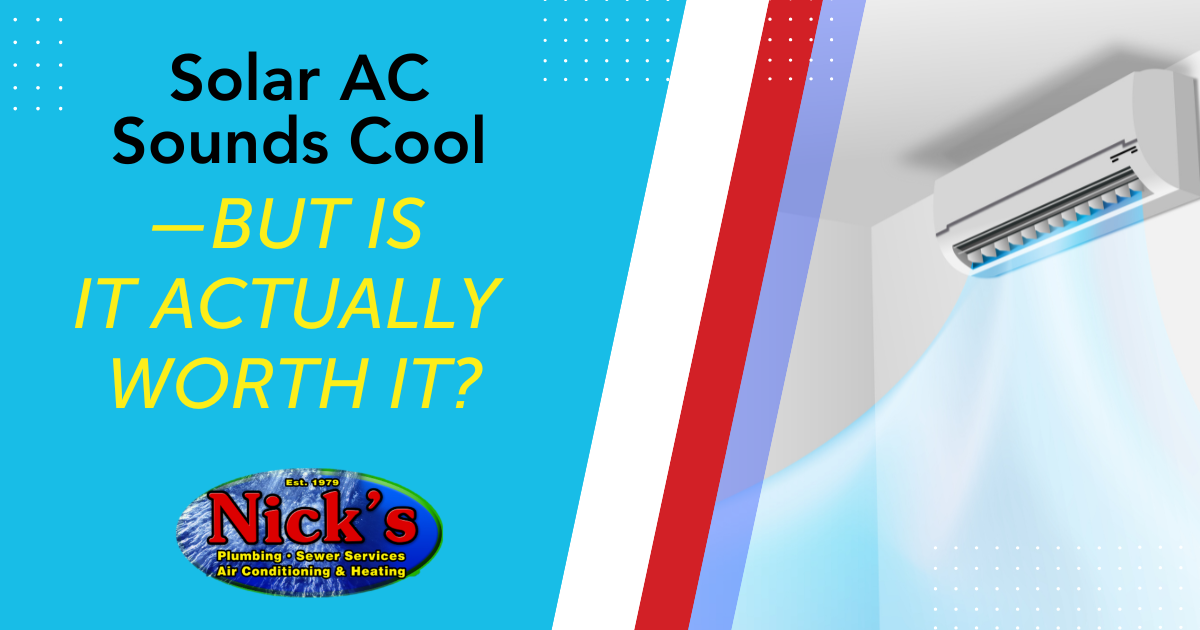Author: Jeff O'Hara
Key Takeaways:
-
Solar-powered HVAC systems can significantly reduce energy bills and increase independence from Texas’s unreliable power grid, especially during Houston’s intense summer heat.
-
While solar offers long-term savings and environmental benefits, the high upfront cost, need for battery backup, and site-specific limitations (like roof space and sun exposure) may not make it practical for every homeowner.
-
Nick’s Plumbing does not install solar systems, we offer expert guidance on improving your HVAC efficiency through conventional upgrades and maintenance, helping homeowners stay comfortable and save energy.
There’s something undeniably appealing about the idea of running your HVAC system off of solar energy. Knowing that if a power outage occurs, you’ll still be able to keep your home comfortable can be a tremendous relief for the homeowner. In a large metropolitan area like Houston, summer heat and humidity send AC systems into overdrive, which in turn puts an enormous strain on Texas’s unreliable stand-alone power grid. And we all know what happens next.
Anyone who has lived in Texas for more than a couple of decades will remember the almost statewide blackouts of 1989, 2006, 2011, and 2021. With each of these incidents, the reliability of the Texas power grid has been called into question, as the cause of all the long-term blackouts was not due to supply shortages, but rather a lack of power generation plants online, a cost-saving measure for the utility companies.
So naturally, using solar power systems to harness the sun’s energy to power your home’s heating and cooling systems seems like the perfect solution. But even as the concept of solar-powered AC may sound futuristic and eco-friendly, the question remains: is switching your HVAC to use solar energy a smart move for homeowners today?
Solar HVAC systems promise reduced utility bills, improved energy efficiency, and a lighter environmental footprint. This all sounds great on paper, but the reality of residential solar power is a bit more complicated. Before you start pricing solar panels and converting your attic into a solar hub, let’s unpack the pros, cons, and practical considerations of going with solar for your home’s HVAC power.
What Is Solar-Powered Air Conditioning?
A solar air conditioner is a traditional HVAC system that is connected to a solar power generator, utilizing energy collected from photovoltaic (PV) solar panels to power the cooling and heating systems. These units can be fully solar-powered (off-grid) or hybrid (solar with grid backup).
While solar HVAC systems can lower your energy bills while reducing your dependence on the power grid, they won’t operate entirely independently unless they are paired with some form of battery storage. Without battery backup, your system will need to rely on the grid at night or during extended periods of cloudy weather. That’s an essential point for anyone considering off-grid air conditioning as a solution in Texas summers.
When It Might Be Time to Switch to Solar AC.
If your energy bills are consistently high due to heavy AC usage, you might start wondering if solar is a better alternative. Homeowners with large roofs, extensive sunlight exposure, and older or less efficient HVAC systems are considered the best candidates for this type of installation.
Let’s say you’re planning to stay in your current home for the long haul. Since solar HVAC systems typically take several years to recoup their upfront costs, they make the most sense for homeowners who aren’t planning to move anytime soon.
If you’re also interested in eco-friendly HVAC options and cutting your carbon emissions, solar may tick all the right boxes.
Pros of Installing a Solar AC System
The most attractive advantage of solar-powered HVAC is the potential for long-term energy savings. During Houston’s blazing summers, solar can dramatically reduce your electricity costs by offsetting peak-time energy consumption. With the right system and conditions, homeowners can reduce utility bills by up to 75%.
Beyond the savings, solar systems offer environmental benefits. By generating your own electricity, you reduce your family’s reliance on the ERCOT grid and contribute to a more sustainable energy option; the sun isn’t going anywhere. For homeowners looking to be more “green-friendly”, switching to solar is a sizable step toward reducing their home’s carbon footprint.
There are also financial incentives to consider. Federal programs, such as the Solar Investment Tax Credit (ITC), offer a 30% tax credit on qualified solar installations. Some state and local rebates may further reduce the net cost of going solar, making it more financially feasible than it initially appears.
Potential Drawbacks to Consider
Despite its benefits, a solar HVAC system isn’t without its challenges. The most significant is cost. A complete system installation—including solar panels, inverters, wiring, and sufficient battery storage—can range from $15,000 to $25,000 for a smaller home. Obviously, as the square footage of the home increases, so does the cost of the solar system required to power the HVAC.
Solar panels also require sufficient space and sun exposure. Shaded roofs, complicated architecture, or limited roof space can reduce system performance and increase costs. Additionally, solar panels don’t produce power at night, and reduced output on cloudy days will require supplemental grid power or a battery backup to maintain the comfort of your home.
Maintenance is another consideration. While solar panels are generally low-maintenance, the HVAC components still need regular servicing just like conventional systems. Plus, if something goes wrong, repairs may require specialized knowledge or have warranties that can be voided if tampered with by someone other than a manufacturer’s authorized repair company.
What Can Affect a Solar-Powered Air Conditioning System’s Performance?
The performance of a solar HVAC system depends on several variables. The biggest is sunlight availability. Houston has a generally favorable climate for solar energy, but properties with well-shaded areas or oddly oriented roofs may struggle to reach their full potential.
System sizing also plays a massive role in how your solar-powered HVAC unit will perform. To effectively run an HVAC unit, your solar system needs to generate enough power to meet your home’s cooling demand, and that demand can be substantial. A central AC unit might require 3,000 to 5,000 watts of continuous power, which could mean installing anywhere from 10 to 20 solar panels, depending on panel efficiency and your household’s daily energy use.
Battery storage significantly enhances the reliability of a solar-powered HVAC system, but it also substantially increases the upfront investment. Without batteries, your system will rely on grid power at night or during periods of low sun exposure. For most homeowners, a hybrid solar HVAC setup is more financially and logistically sensible.
When a Solar AC System Is (and Isn’t) Worth It
Solar AC systems are most worthwhile when your household has high energy usage, access to strong sunlight, and the budget for a long-term investment. If you’re already facing steep electricity bills in summer, the long-term savings may outweigh the upfront cost, especially when combined with available incentives.
But if you only use your HVAC system occasionally, or you plan on moving within the next few years, solar likely won’t pay for itself in time. And while solar HVAC is a strong contender in new home builds and eco-conscious renovations, retrofitting an existing home can be a challenge depending on the layout, roof angle, and breaker box capacity.
Solar-Powered HVAC Systems Are an Environmentally Conscious Choice –But Only For the Right Homes
Running your HVAC system on solar power may sound like a dream, but like most home upgrades, it comes with trade-offs. For Houston homeowners who plan to stay put, have high summer energy bills, and are ready to make an upfront investment, a solar HVAC system could pay off in the long run. But for many, the math still doesn’t quite work out.
The good news? You don’t need solar panels to make your HVAC system more energy-efficient. From upgrading your thermostat to sealing your ductwork or scheduling regular HVAC maintenance, there are plenty of ways to reduce your utility bills without going fully solar.
Nick’s Doesn’t Sell Solar, But We Can Help You Find Ways to Make Your Home More Efficient!
And if you do decide to explore solar options, Nick’s Plumbing won’t try to sell you on something you don’t need. We don’t install or service solar HVAC systems, but we’re always happy to answer your questions, assess your current HVAC setup, and help you make the best decision for your home’s comfort and energy future.
When HVAC decisions start getting complicated, Nick’s is here to keep things simple. Give us a call, we’ll help you keep your cool – solar powered or not.
Relax, We’re on the Way.


